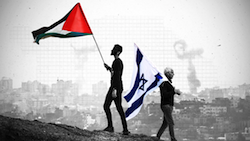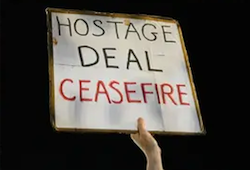The debate on Gaza within the Labour Party has polarised around the whether or not to support calls for a ceasefire. But this isn’t a binary choice, argues WILL BROWN, as recent developments show.
This contribution to the discussion on the war in Gaza is written with some trepidation as I am neither an expert on the middle east nor the Israel-Palestine conflict. Rather, this is a commentary on the debate within the UK Labour Party and wider left and is written from that perspective. Inevitably, it will stray into areas others may well know better.
 Perhaps reflecting the conflictual and aggressive political culture that we now inhabit, reactions to the Hamas terrorist attack on 7 October and Israel’s violent response have quickly descended into an often vitriolic debate that has also coalesced over whether to support calls for an immediate ceasefire.
Perhaps reflecting the conflictual and aggressive political culture that we now inhabit, reactions to the Hamas terrorist attack on 7 October and Israel’s violent response have quickly descended into an often vitriolic debate that has also coalesced over whether to support calls for an immediate ceasefire.
One might have hoped the atrocities committed by Hamas, and Israel’s murderous blockade and bombing of Gaza, would have prompted a more compassionate and even-handed response that recognised the common humanity of victims on both sides. Such voices have been hard to find.
The Guardian’s Jonathan Freedland has been one, reminding us that “this is not a football match … a binary contest in which you can root for only one team”. And there was an open letter from Israeli writers who made a plea to the western left, saying: “There is no contradiction between staunchly opposing the Israeli subjugation and occupation of Palestinians and unequivocally condemning brutal acts of violence against innocent civilians. In fact, every consistent leftist must hold both positions simultaneously.”
However, in general, the ceasefire debate seems to have ignored a number of factors. First, despite the issue generating so much hot air, the Labour Party’s position is of very little importance on the ground. Whether Keir Starmer calls for a ceasefire or not is hardly going to shift the dial one notch. Even if he were prime minister, the UK’s diplomatic influence and leverage in the region is marginal at best.
The debate does have an influence within the UK, however, especially on Labour’s internal divisions and on the party’s electoral prospects in some constituencies. And what the party has to say may have some relevance in terms of expressing solidarity with civilian populations and the beleaguered progressive forces on both sides in the conflict.
But we need to have a little humility in recognising that falling on one side or other of the ceasefire debate isn’t going to affect the chances of one coming about. While the debate has raged on in Britain, those political actors with some influence – the Israeli and Hamas leaders, Qatar and the US – have negotiated the first potential truce.
Second, as the deal announced on 22 November shows, parsing the difference between a humanitarian pause on the one hand and a ceasefire on the other, condemning one as a sell-out of Israel or the other as a sell-out of civilians in Gaza, is to miss several points at once.
Humanitarian law
The difference between humanitarian pauses and ceasefires is a grey area – neither is defined in international law and the practical difference turns on the intended length of the cessation of hostilities.
 International humanitarian law does have much to say about the delivery of humanitarian assistance, the protection of non-combatants and the treatment of the wounded (combatants and non-combatants).
International humanitarian law does have much to say about the delivery of humanitarian assistance, the protection of non-combatants and the treatment of the wounded (combatants and non-combatants).
The choice between a pause and a ceasefire isn’t an either/or question and it’s conceivable that one could lead to another if there was political will on either side. Peace seems a long way off and the ability to achieve it, unlikely as it seems, will be a process, not an event. However, it may be that periods of truce might provide some space for ways forward to be explored, hostage releases to be negotiated and aid to be delivered.
The deal agreed on 22 November – initially a four-day halt in exchange for the release of hostages – is the first sign that either set of leaders is prepared to consider a pause in violence. This may reflect growing pressures on Netanyahu to do something about the hostages and on Hamas due to the dire humanitarian situation in Gaza.
Given what has happened, shouldn’t even these initial limited moves be welcomed if they result in a reduction of violence and an increase in the delivery of food, water, shelter and medical care?
The prospect of any longer-term progress seems to turn on the removal of the hardline leaderships on both sides of the conflict. At present, Israel is saddled with the toxic legacy of Netanyahu’s programme of undermining core pillars of Israel’s democracy, while in Gaza the injustice and injury inflicted by the Israelis may, in fact, shore up a Hamas leadership that was increasingly unpopular before the war started.
However grim the prospects, the focus of the UK Labour left needs to rise above its fixation on a false binary choice over a ceasefire, and the name-calling and denunciations that have characterised the debate so far.
—-
Will Brown is a UK academic working in politics and international relations.
Some other suggested reading not linked in the text:
- Kenan Malik in The Observer on the importance of a more humanitarian response than picking sides.
- Mailk cites Jewish writer Joshua Leifer writing in Dissent of the need “to hold everyone’s humanity” in mind.
- A report on the state of the Israeli peace movement in Foreign Policy journal.
This article is part of a debate on the Israel-Palestine conflict. As such, it reflects the views of the author and not necessarily those of the ILP or its National Administrative Council.


